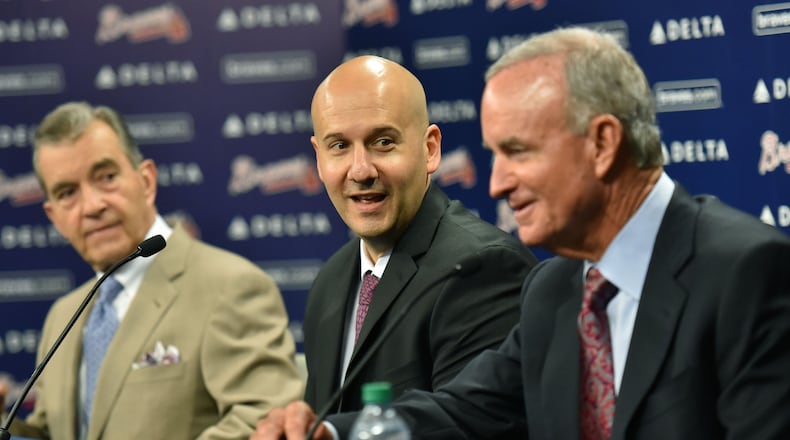Another week has passed without resolution in Major League Baseball’s investigation of the Braves, and uncertainty, anxiety and dread linger over the team’s front office heading into baseball’s General Managers Meetings that start Monday in Orlando.
It’s not known when MLB will announce its findings and levy discipline, but the Braves are expected to face severe penalties that could include fines, the loss of future draft picks and the loss of players, if it’s deemed that rules were broken in the signing or drafting of those players.
President of baseball operations John Hart currently serves as de facto general manager and is set to handle those duties at next week’s GM meetings, but it’s unclear how much longer he’ll will stay with the organization and whether he’ll be affected by the MLB investigation findings.
When the Braves announced Oct. 2 that general manager John Coppolella and international scouting supervisor Gordon Blakeley had resigned – those were forced resignations – after the investigation revealed what the team called a breach in MLB rules concerning the international free-agent market, Hart said the Braves thought the investigation was nearing its conclusion and results might be announced sooner rather than later. CEO Terry McGuirk said something similar two weeks later.
But sooner passed and later has become significantly later. MLB still hasn’t concluded its investigation, which, as it turned out, involved far more than a single alleged breach of rules governing the international free-agent market. It was widespread (alleged) malfeasance in that area and in the domestic draft that had MLB investigators interviewing multiple Braves officials ranging from upper management to front-office employees, special assistants and scouts.
And it’s still not over: Blakeley traveled to New York on Thursday to meet with commissioner Rob Manfred, the second time he has met with MLB, but the first time at MLB headquarters.
It’s not known what was discussed or if Manfred and his investigators still have others to talk to, but a person familiar with the situation said MLB still was trying to discern exactly what was known by whom in the Braves organization – i.e., how much about the alleged infractions committed by Coppolella and Blakeley was known by team higher-ups, including Hart and others before, during or after those alleged infractions occurred.
Hart and the Braves are in the awkward position of interviewing potential replacements for Coppolella, when it’s still not a certainty if they’ll need to also replace Hart. They talked to at least three or four prospective GMs in the past couple of weeks, but were denied permission (so far) by the Royals to talk to Dayton Moore.
Other possible candidates could include Doug Harris, Alex Anthopoulos, Ben Cherington, Jim Hendry and Dan Jennings.
Many inside and outside the Braves organization believe Moore, with a sterling reputation, would be the ideal replacement with the front office currently in turmoil and the Braves’ image tarnished. It’s possible the Royals owner could relent and allow Moore to interview with the Braves if he desires, but the Braves likely would have to compensate the Royals since Moore remains under contract to the Royals.
Also, it’s assumed that if Moore came to the Braves it would be only if he were given full control of baseball operations, the role that Hart currently holds. Other candidates include some who could come in as GM under Hart, should he stay.
Hart’s contract expires at the end of the year, and the Braves haven’t said whether he’ll return. He’s been looked into by MLB officials regarding any involvement or knowledge he might have had of Coppolella’s and Blakeley’s alleged rule-breaking.
While a report in late October quoted anonymous sources saying Hart had been essentially cleared by MLB, subsequent developments called that premise into question. A person close to the situation said at least one Braves employee who was with the team during the time of the alleged infractions informed MLB that Hart knew what Coppolella was doing on the international free-agent market and didn’t just ignore it, but approved of it.
About the Author
Keep Reading
The Latest
Featured


